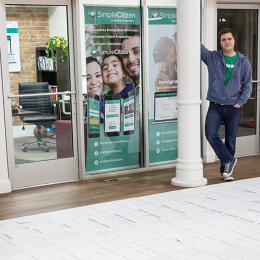The Business That Love Built: How An Entrepreneur Created His Green Card Startup
Sam Stoddard spent two years in South Korea in his early twenties on a mission for the Mormon Church. An Oregon native, he was glad to immerse himself in a culture significantly different from his own. He learned to eat kimchi. He struggled with the challenging Korean language. His jaw dropped at certain local mores, like the fact that the elderly could cut to the front of long lines. For the first time in his life, Stoddard began to understand what it felt like to be the Other, and what it might feel like to be an immigrant in his own country.
“Taking the time to see the world through their eyes was a challenge,” he says. “But it was one of the most rewarding things.”
Stoddard returned to the U.S. in June 2008, and began his undergraduate studies at Brigham Young University in the fall of 2010. Once at BYU, he naturally gravitated to the small South Korean student population there. One day during his first semester, he was at a South Korean friend’s party when he noticed a pretty young woman enter the room. Her name was EunJoo, but she went by Ally. She had chosen the name Ally because of the TV show Ally McBeal, finding that it usually took too long to teach Americans how to pronounce her name (it’s un-JOO).

As the party progressed, the group began to play a card game. There was a feature of the game that Stoddard says is “common in Korean culture,” which is that if you lose, there is “some sort of punishment, whether a slap on the wrist, or you have to do something embarrassing.” For this game, the loser had to drink a gross, soupy concoction made of soy sauce, ketchup, salt, and a bit of kimchi. From the sight of it, Stoddard guessed “there was a week’s worth of sodium in there.”
EunJoo lost. Someone passed her the cup. She took one sip, then shook her head. She just couldn’t do it.
She turned to Stoddard. Would he take the hit for her?
He took the cup, and drank it all.
“That was probably the initial spark,” he says.
They began to date, and three years later, Stoddard got down on one knee and proposed. She said yes. He had just made the most consequential decision of his life. Though he didn’t know it at the time, it set in motion events that would lead to his first startup.
“Even after the wedding, I was naive,” he says. “I thought, ‘She’s married to me. Now, she’s probably a U.S. citizen.’ But that’s not how it works at all . . . “

Stoddard had heard the term “green card,” of course. But he thought it was something that just sort of happened: You get your permit to live and work permanently in the U.S. and then you apply for citizenship. To find out more, he attended a lecture at BYU that an immigration attorney was giving on the green card process.
The lawyer stood up on stage and went through a PowerPoint overview of how to apply. Stoddard took reams of notes on Evernote, but because of a glitch with the Wi-Fi, all the information he’d typed in disappeared. So he emailed the attorney, who told him he’d have to come in for an appointment to look at her slide deck. “That was the first point where I thought, ‘Oh. This is going to be a little more difficult than I thought.’”
When Stoddard met the lawyer, she walked him through the complicated paperwork. He was an accounting major with an emphasis in tax, but these forms looked even more daunting than what he was used to. Then the lawyer mentioned her fee, $3,000, and Stoddard decided he would be filling out the forms himself.
Maybe it would take him a couple hours, he figured. He went online, looking for tutorials, and Googled “Turbotax for immigration,” but found nothing that he trusted. He soldiered on for six months, steeling himself against horror stories he’d heard of family members being deported.
Once he got his paperwork completed, he called up the lawyer again and scheduled an audit for peace of mind. For $500, she would review everything to make sure there were no fatal flaws.
Stoddard went into the office, where the attorney immediately had her secretary process the check. Then she invited Stoddard in, glanced through the green card application, and swiftly pushed it aside. “Wow, you were really thorough,” she said. Then she leaned in and started pitching him on why he needed to retain her for additional legal services in which he had no interest. “If you ever get divorced, it could be terrible for you . . . ” she said.
Stoddard was exhausted and furious. He had been through months of tedium—over 100 hours of checking and rechecking his work, only to be shorn of $500 by a lawyer whose job could probably be replaced by . . . software.
“That was the lightbulb moment for me,” he says.

Stoddard’s struggle and frustration bore fruit in the form of a startup called SimpleCitizen. From early 2014 to early 2015, Stoddard, along with a cousin, began to research the market for a sort of “TurboTax for immigration.” They interviewed other BYU students who were struggling with green card applications of their own. (There are many international marriages at BYU, likely the result of missions abroad.) They officially incorporated in February 2015, with $700,000 raised in seed funding, plus $400,000 in other prize and grant money. They’re now about to graduate from Y Combinator’s summer 2016 class.
With SimpleCitizen, Stoddard created the service that he and Eunjoo needed several years ago. He explains it as “an online platform that eases the complex, multiyear green card and citizenship process that 3 million people go through every year. The platform guides users through their entire application: users answer questions and upload supporting documents, and then SimpleCitizen translates the documents if necessary, and sends the application to be reviewed by an immigration attorney.” SimpleCitizen promises “accurate, completed documents ready to submit to the USCIS”—that is, the U.S. Citizenship and Immigration Services. Filing with SimpleCitizen costs $249, and the company claims to have already saved immigrant families almost a million dollars in legal fees.

Of our country’s current climate toward immigrants, epitomized in the incendiary rhetoric of Donald Trump, Stoddard says, “It breaks my heart.”
Uprooting oneself to a new country is difficult enough without being the target of vicious hate speech. So Stoddard hopes that he is doing his small part to relieve at least some of the sting of the process of becoming American—while also creating what seems like a viable business. Last November, the Washington Post reported that after a decade and a billion dollars spent to upgrade its system, USCIS had only managed to digitize one of the nearly 100 forms required. The agency currently processes over 56 million pages of paper per year, according to Stoddard.
His business aims to do much better.
Fast Company , Read Full Story
(40)











